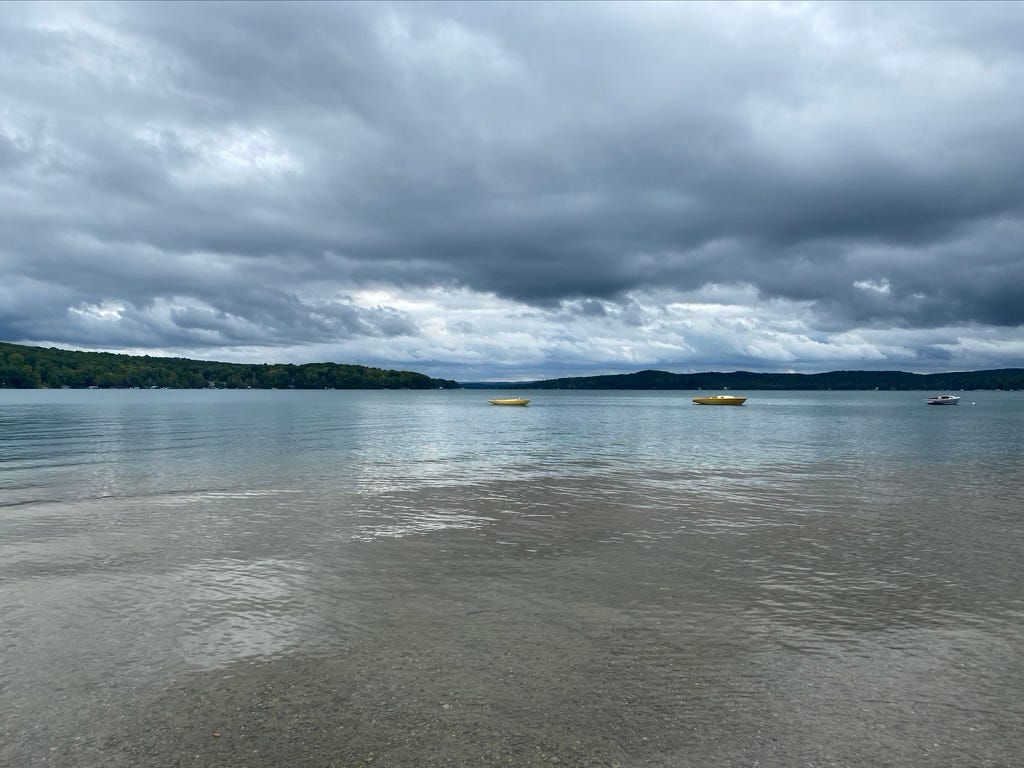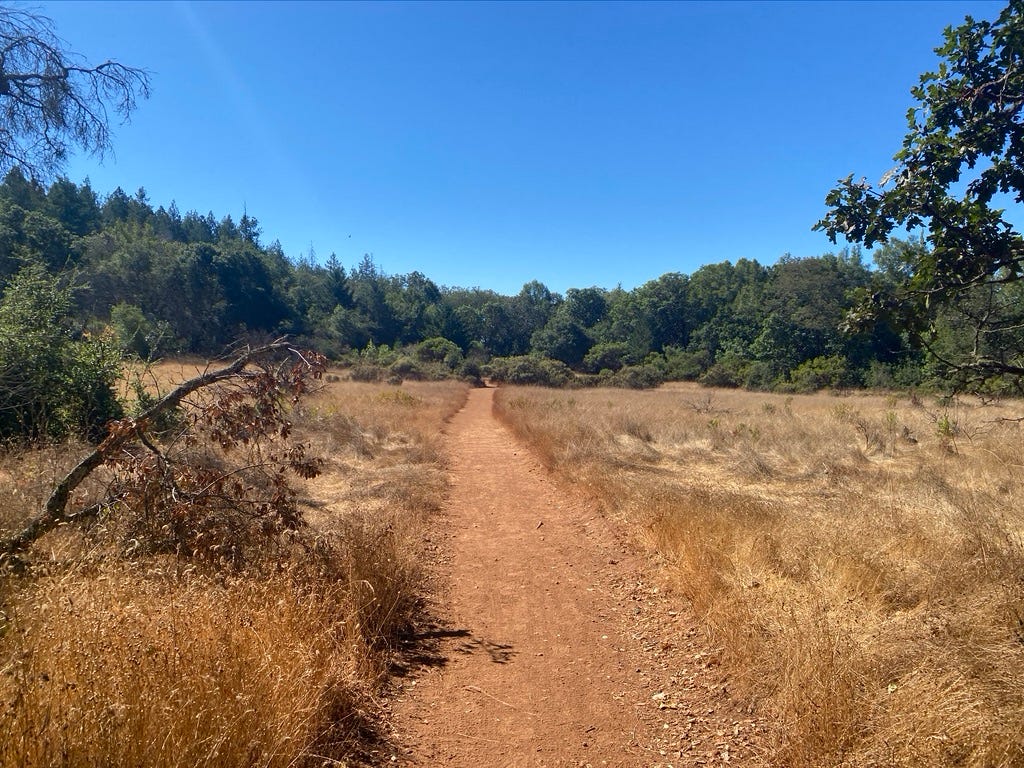Now Is The Deep Wonder
My year of slow reading
Within the first few days of starting grad school last fall it became apparent to me that I was going to be on the hook for more reading in a more compressed amount of time than I’d ever been. I suppose I knew this in the abstract ahead of time, but knowing and doing are often unrelated.
This year, then, as a counterweight to the fever pitch of reading, skimming, annotating, and synthesizing work that stretches into the hundreds of pages some weeks, I’ve switched up my framework for reading for pleasure. Outside of school I’ve always got two or three books in the rotation; I’m never not reading something. (Especially at night. I’m as addicted to my phone as anyone but I jealously guard those last thirty to sixty minutes before I fall asleep as book time.) And since January I’ve put some slow reads into that schema: a book or two I think of as a sort of secular Daily Devotional, in practice or in theme or both.
My main text in this category is Hal Borland’s Book of Days. Borland, an on-staff outdoors writer for The New York Times for more than forty years, spent 1975 observing the natural processes at work on his Connecticut farm and logging daily entries about what he saw there, and what other musings and conclusions those observations led him to. Some entries are downright lyrical:
APRIL 1
The world is full of beginnings now, and beginnings are often more interesting, sometimes even more important, than what follows. The vernal change has started. The color will return, the bright pennants of spring, the blossoms of a fresh, new world.
But the great change comes now, before the full flowering. Now is the deep wonder, for the bud itself is the miracle. To watch the upthrust of a daffodil, to see it take form as a flower-to-be, to see the bud grow and take on the warmth of color—there is the very synthesis of spring. But once open, it is a flower, color, perfected beauty; and once open it begins to fade, imperceptibly but also inevitably.
Thus it is with a bud, all buds. Spring is there in the flower within the bud, but the miracle is in the beginning, the way that bud opens.
You see a birch on the hillside, its buds fat against the sky. You watch the slow deliberation as it comes to that moment when the first pale leaf tips appear, when the tree stands in all the delicacy of April’s green mist, no longer in bud, not yet fully in leaf. Or the way bloodroot comes to flower, opening that fat green bud. Or the way a violet lifts its buds for the sunlight to warm and slowly unfold. That, to me, is April, the swelling bud, the beginning.
Today I went up and saw April among the birches.
Others are hilariously droll, even petty:
OCTOBER 9
I saw an opossum today, just down the road, and his whole face told me that he had spent most of the day eating wild grapes. Possums are the most untidy animals I know, and in many ways the most inept. They don’t belong this far north. Every winter I see a possum picking its way through the snow with the most self-pitying look imaginable on its face.
It takes two steps and sits back and shakes those pinkish forefeet, practically shivering, no matter what the temperature is. I don’t know how many times I have stopped my car and got out and pushed a poor chilblained possum out of the wheel ruts in the snow, over to the roadside bushes, so I could get past without running over the stupid beast. They freeze their ears and even their tails, which almost cripples them—their tails are prehensile; they use them in climbing trees to get at those wild grapes, as well as bird nests. A possum will eat anything it can get down its throat.
Possums always remind me of what I was saying a few days ago about the human hand and the opposed thumb. The opossum and the raccoon are perfect examples of what a brain can do and what a hand cannot.
I have followed Borland’s trail through 2024, reading the corresponding day’s entry each night. And what began as a frustrating task of reading only those scant few paragraphs before closing the book and opening another—Borland writes beautifully, and my brain tells me in all categories to rush and consume—has become a slow, measured activity that I relish. It’s taken over the household, too: I was sharing so many facts and anecdotes from the book that my wife suggested we start taking turns reading the entries to each other. So now the work is halved and the joy is doubled.
Still it is bizarre, even unsettling, to read observations of the natural world from fifty years ago. It’s striking how new some of our knowledge of the world really is: Borland devotes several days’ worth of entries to exploring the different possibilities for how the dinosaurs might have gone extinct; nowhere does he mention the now-settled theory that an asteroid struck the Yucatan. Striking, too, how much the world has changed: the first frost comes to Borland’s farm by late September, and by mid-October the fall colors are already at their peak. I look out my window as I write this and the leaves on the trees in the park are mostly still green, though some skipped the colorful stage entirely and went straight to brown, and fell. It was in the high seventies each afternoon here in Michigan through last week.1
As I said, when I close the Book of Days each night I do open another, and while I still burn through those at something like my usual pace I find myself using the lessons of Borland to keep me from rushing too headlong from story to story. (It even took me nearly eight months this year to finish Gravity’s Rainbow, though that was due less to my own principled discipline and more to the monumental task of reading Thomas Pynchon at all.) It has helped that I find myself drawn to something like thematic cohesion in my books of choice: David George Haskell’s The Forest Unseen, another of this year’s reads, also covers a year of the author’s observations of the natural world, in this case a “mandala” of old-growth forest in Tennessee. Haskell picked a hula hoop-sized spot at random in the woods near his home and returned there throughout the year to report chronologically on what he observed. Like Borland, Haskell’s observations end up spinning out far beyond his line of sight: a vulture overhead prompts a whole chapter on the ecological impact of vultures worldwide, a golf ball beneath the leaf litter causes a philosophical exploration of whether those things that man produces can be counted as part of the nature, since we ourselves are.
It feels good to read like this. Not just about the world and its seasons, but in time with them. Not everything can fit these categories, I know. But I also know how important it is for me to practice noticing. Noticing is different from looking, I think. Looking can be instantaneous. But noticing requires stillness, and stillness is getting harder and harder for us all. Don’t you feel that way? It can’t just be me, can it? (This is maybe the ethos of this whole newsletter project: It can’t just be me, can it?) I’m grateful for the opportunity to practice, and to get those reminders to return to the rhythms of the world when I can. After all, as Hal Borland writes in the poem to his wife that serves as a dedication to the Book of Days:
...And then I say that all I know can be stowed away in an acorn cup.
Thanks, as always, for reading. I’ll talk to you next time.
-Chuck
PS - If you liked what you read here, why not subscribe and get this newsletter delivered to your inbox each week? It’s free and always will be, although there is a voluntary paid subscription option if you’d like to support Tabs Open that way.
I read last night, in Jerry Dennis’ The Living Great Lakes, that in my lifetime those lakes will have gone from 75% winter ice coverage to less than 10%. It seems like every day now brings new devastating knowledge of what we have done to this world, and I spend, conservatively, several hours each day with thoughts like this in mind. It is ennervating to know that I will do so for the rest of my life barring some miracle breakthrough in curing capitalist greed and human stupidity.





I like to read but often don't make time for it. I started a book co promotion group so I could get accountability for reading new books by modern authors. So far I've read 4 books as a result and I'm really enjoying it.
I have two, possibly three, books here that I have been planning to send you for your upcoming birthday, but then I worried -- does he have any time to read for pleasure? Question answered. So the books will soon go in the mail (although I may want to finish one of them first, ha ha). As for your other question -- no, it's not just you. It's harder than ever, and it's commendable and healthy that you are able to carve out moments of stillness. Too many of us have no clue how to do so, or, sadly, any interest in making the effort.